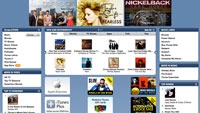Apple iTunes removes copy protection

It was a long time coming, but Apple announced at MacWorld last week that it has finally succeeded in removing copy protection from all of the music it sells on its popular iTunes online store.
Beginning last week, three of the four major music labels — Sony Music Entertainment, Universal Music Group and Warner Music Group — began selling music through iTunes without digital rights management software (DRM), which controls the copying and use of digital files. The fourth, EMI, was already doing so.
In return, Apple, whose dominance in online music sales gives it powerful leverage, agreed to a longstanding demand of the music labels and said it would move away from its insistence on pricing all individual song downloads on iTunes at 99 cents.
Instead, the majority of songs will drop to 69 cents beginning in April, while the biggest hits and newest songs will go for $1.29. Others that are moderately popular will remain at 99 cents.
Apple will also deliver higher quality music, upping the download to 256Kb/s using AAC encoding. Earlier downloads were 128Kb/s. Competing online stores that sell copy protection free recordings normally use the MP3 encoding method, which is of lower audio quality.
Now, with all copying restrictions removed, users will be able to freely trade the songs they buy on iTunes among computers, phones and other digital devices. The earlier protected files from iTunes did not work on portable players made by companies other than Apple.
“I think the writing was on the wall, both for Apple and the labels, that basically consumers were not going to put up with DRM anymore,” Tim Bajarin, an analyst with Creative Strategies, a market research company, told the “New York Times.”
Get the TV Tech Newsletter
The professional video industry's #1 source for news, trends and product and tech information. Sign up below.
Music industry watchers widely applauded the move and said it could help digital music sales, which have shown signs of slowing down just five years after Apple introduced iTunes. The “Times” noted that industry pundits have long pointed to DRM as one culprit for the music companies’ woes, saying it alienated some customers while doing little to slow piracy on file-sharing networks.
Apple has been campaigning against DRM at least since February 2007, when the chief executive, Steven P. Jobs, wrote an open letter criticizing the software. Apple reached a deal with EMI that year to offer music without the copying restrictions.
But it could never reach the same agreement with EMI’s larger rivals, Sony, Warner and Universal. It is not clear what broke the impasse, but the deteriorating economy may have put pressure on music companies.
Apple said its customers can pay a one-time fee to strip copying restrictions from music they have already bought on iTunes, at 30 cents a song or 30 percent of the album price.
The company also said that its popular iPhone would be able to download songs from iTunes over wireless data networks like AT&T’s. Previously, iPhone owners had to either attach the phone to a computer or connect to a local WiFi network.
Television and motion picture content were not affected by the copy protection removal.
